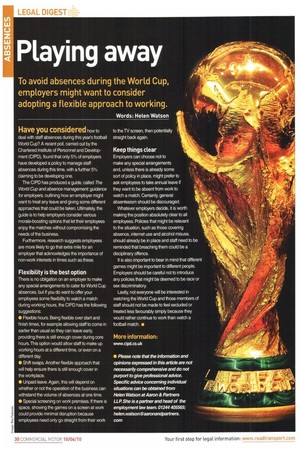Playing away
Page 30

If you've noticed an error in this article please click here to report it so we can fix it.
To avoid absences during the World Cup, employers might want to consider adopting a flexible approach to working.
Have you considered how to deal with staff absences during this year's football World Cup? A recent poll, carried out by the Chartered Institute of Personnel and Development (CIPD), found that only 5% ol employers have developed a policy to manage staff absences during this time. with a further 5% claiming to be developing one.
The CIPD has produced a guide, called The Worki Cup and absence management guidance for employers, outlining how an employer might want to treat any leave and giving some different approaches that could be taken. Ultimately, the guide is to help employers consider various morale-boosting options that let their employees enjoy the matches without compromising the needs of the business.
Furthermore, research suggests employees are more likely to go that extra mile for an employer that acknowledges the importance of non-work interests in times such as these
Flexibility is the best option
There is no obligation on an employer to make any special arrangements to cater for World Cup absences, but if you do want to offer your employees some flexibility to watch a match during working hours. the CIPD has the following suggestions: • Flexible hours Being flexible over start and finish times, for example allowing staff to come in earlier than usual so they can leave early. providing there is still enough cover during core hours. This option would allow staff to make up working hours at a different time, or even on a different day.
• Shift swaps. Another flexible approach that will help ensure there is still enough cover in the workplace • Unpaid leave. Again, this will depend on whether or not the operation of the business can withstand the volume of absences at one time • Special screening on work premises If there is space, showing the games on a screen at work could provide minimal disruption because employees need only go straight from their work to the TV screen, then potentially straight back again.
Keep things clear Employers can choose not to make any special arrangements and, unless there is already some sort of policy in place, might prefer to ask employees to take annual leave if they want to be absent from work to watch a match. Certainly, general
absenteeism should be discouraged Whatever employers decide, ills worth making the position absolutely clear to all employees. Policies that might be relevant to the situation, such as those covering absence, Internet use and alcohol misuse, should already be in place and staff need to be reminded that breaching them could be a disciplinary offence.
It is also important to bear in mind that different games might be important to different people. Employers should be careful not to introduce any policies that might be deemed to be race or sex discriminatory.
Lastly, not everyone will be interested in watching the World Cup and those members of staff should not be made to feel excluded or treated less favourably simply because they would rather continue to work than watch a football match. •
More information:
www.cipd.co.uk • Please note that the information and opinions expressed in this article are not necessarily comprehensive and do not purport to give professional ad vice. Specific advice concerning individual situations can be obtained from Helen Watson at Aaron & Partners LLP. She is a partner and head of The employment law team. 01244 405565; helen.watson@aaronandpartners.




























































































































